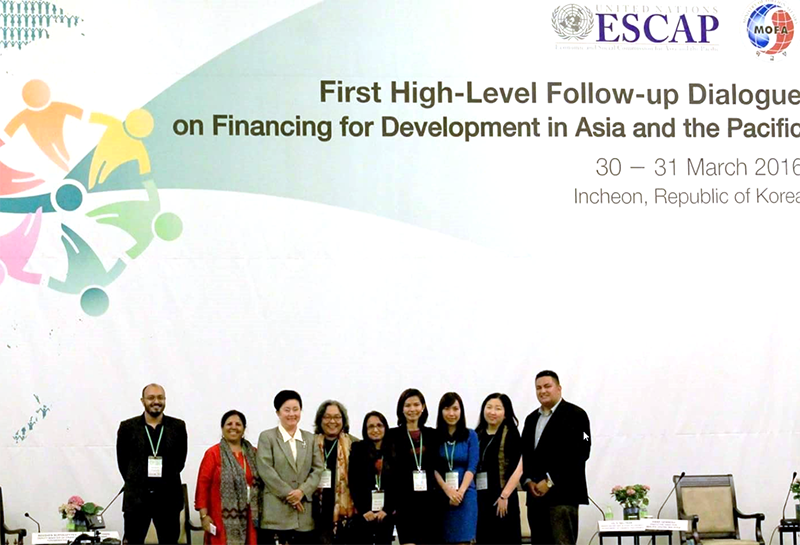Cai Yiping
Development Alternatives with Women for a New Era (DAWN)
China
Cai Yiping is Executive Committee member of Development Alternatives with Women for a New Era (DAWN). She is the member of UNWomen Asia Pacific Civil Society Advisory Group and advisory group member for the Asia Pacific Regional Engagement Mechanism. Her current engagements cover the multiple processes in the national, regional and global levels on the 2030 development agenda/SDGs, ICPD beyond 2014, and Beijing+20 process. She is currently based in Beijing China.
Kabita Gautam
BYND2015 Nepal Hub
Nepal
Kabita Gautam is an enthusiastic, active and energetic young female activist who has been mobilizing young people, building their capacity and raising voices from grass root level. She is the founder of BYND2015 Nepal Hub and recently engaged in a government project Nepal Climate Change Support Programme (NCCSP). She has been involved in decision and policy-making processes as one of the representative for Major Group for Children and Youth, also a former youth focal point in Asia Pacific Regional CSO Engagement Mechanism (AP RCEM).
Lesa Andrew
Pacific Young Women’s Leadership Alliance
Samoa
Lesa is the 25 year old spokesperson for Samoa on the UN SIDS Youth Network and a long-serving indigenous youth leader across the Pacific with more than 12 years of civil society experience. His focus is disadvantaged youth, LGBTIQ and indigenous peoples. He is a proud member of the International AIDS Society, Peace Child International, Youth Coalition for Sexual and Reproductive Rights, the Pacific Youth Council and the Commonwealth Youth Programme.
Linh Phuong Nguyen
Research Center for Management and Sustainable Development (MSD)
Viet Nam
Linh Phuong Nguyen is the Director of the Research Center for Management and Sustainable Development (MSD) in Vietnam from 2009. Ms. Linh holds master degree of Strategic Management from London Metropolitan University, UK and many certificates relating to strategy, management and development and human right education from many recognized national and international training and education organizations. She has recognized and honored as a best leader of NGO nationally and internationally.
She has worked in civil society for more than 10 years. With MSD, she was elected as the general coordinator of the Action for CSO Development Alliance (CSA Vietnam) – an alliance of Vietnamese CSOs throughout Vietnam, which advocates and promotes for an enabling environment the development of Vietnamese CSOs and then selected the Southeast Asia focal person of CSO Partnership for Development Effectiveness. She has been engaged in multiple processes at different levels of Busan 2011, UN Post 2015 and SDG, etc.
Meena Bilgi
Women Organizing for Change in Agriculture and Natural Resources Management (WOCAN), India
Meena is an Independent Development Professional with extensive Grass Root and Managerial experience in Natural Resources Management and Livelihoods Promotion with specific focus on Gender Equality both in India and Low Income Countries. She is pursuing Doctorate in “Gender Budgets and Public Policy”. She is Core Associate with (WOCAN); Steering Committee Member of Gender and Water Alliance (GWA), Ex-Advisory Group Member for the Asia Pacific Regional Engagement Mechanism (AP-RCEM) and Asia-Pacific Ex-Regional Representative for UNEP (Major Groups and Stakeholders) and AP-Alternate for UNEP (Major Groups and Stakeholders) and (Sustainable Consumption and Production). She has been engaged in multiple processes at all levels on Agenda 2030, Climate Change negotiations, UNEA, Beijing +20 processes.
Monthip Sriratana, Ph.D.
Asia Pacific Regional Council
International Council of Women
Thailand
Queenie Diane Malabanan
The Reality of Aid Network
Philippines
She is currently the Program Officer for The Reality of Aid Network, a North/South international governmental initiative focusing on analysis and lobbying for poverty eradication policies and practices in the international aid regime.
Rayyan Hassan
NGO Forum on ADB
Currently the executive director of NGO Forum on ADB; he is also: Co-Chair Finance Working group Asian Development Alliance; Steering Committee Member for the Coalition on Human Rights and Development; Steering Committee Founding Member of the Asian Peoples Safeguards: Platform for Action. Mr. Hassan has been closely working with civil society groups and social movements across South East Asia, South Asia, Central Asia and Caucus to help build capacity on monitoring the AIIB and ADB funded Large Scale Infrastructure Projects and respective Environmental and Social Safeguard Policies and Accountability Mechanisms. Mr. Hassan is also continually engaged in high-level advocacy with the ADB Board of Directors, AIIB Secretariat, WB Board of Directors, European Commission, UN Post MDG 2015 Processes and the Ministries of Finance and Treasury agencies of the government’s of USA, Germany, Netherlands and Japan. He is based in Manila and continues to advocate for economic, social and environmental justice across Asia.
Titi Soentoro
Aksi! for gender, social and ecological justice
Indonesia
She has been active in environmental, social and women’s movements in Indonesia and Asia in the context of development and recently climate change financing. Soentoro advocates for gender considerations, participation, transparency, accountability and safeguards in policy drafts and reviews of the International Financial Institutions (IFIs), particularly the Asian Development Bank (ADB), World Bank, and Green Climate Fund (GCF). She also critically monitors Clean Technology Fund (CTF), Forest Investment Program (FIP), ASEAN Economic Community and the ASEAN Infrastructure Fund.

